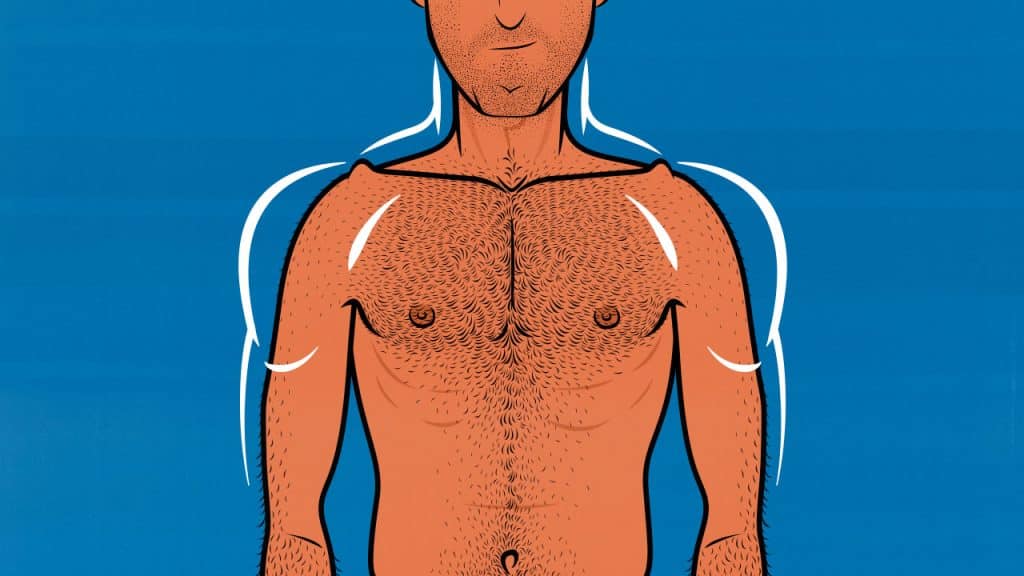
How to Build Much Broader Shoulders
Broad shoulders are touted as one of the most attractive features a man can possess. That’s not wrong. You can build broader shoulders, and when you do, it will improve your appearance. But that’s not quite how aesthetics works. In fact, it’s almost entirely backwards. More on that in a moment.
Then there’s the issue of bone structure. The length of your collarbones is largely genetic, and that’s a big part of determining how wide your shoulders can get. If you have a thinner build, it’s easy to assume you’re fated to have narrow shoulders. But that isn’t quite right, either. I’ve added over a dozen inches to my shoulder circumference.
We’ve helped over 15,000 people bulk up, tracking their progress along the way. If you spend the next 6 months bulking up your shoulder muscles, how much broader can you get them? To answer that question, we tracked our client results. We’ll show you their before/after photos and measurements to give you a realistic idea of how much broader you can get your shoulders.
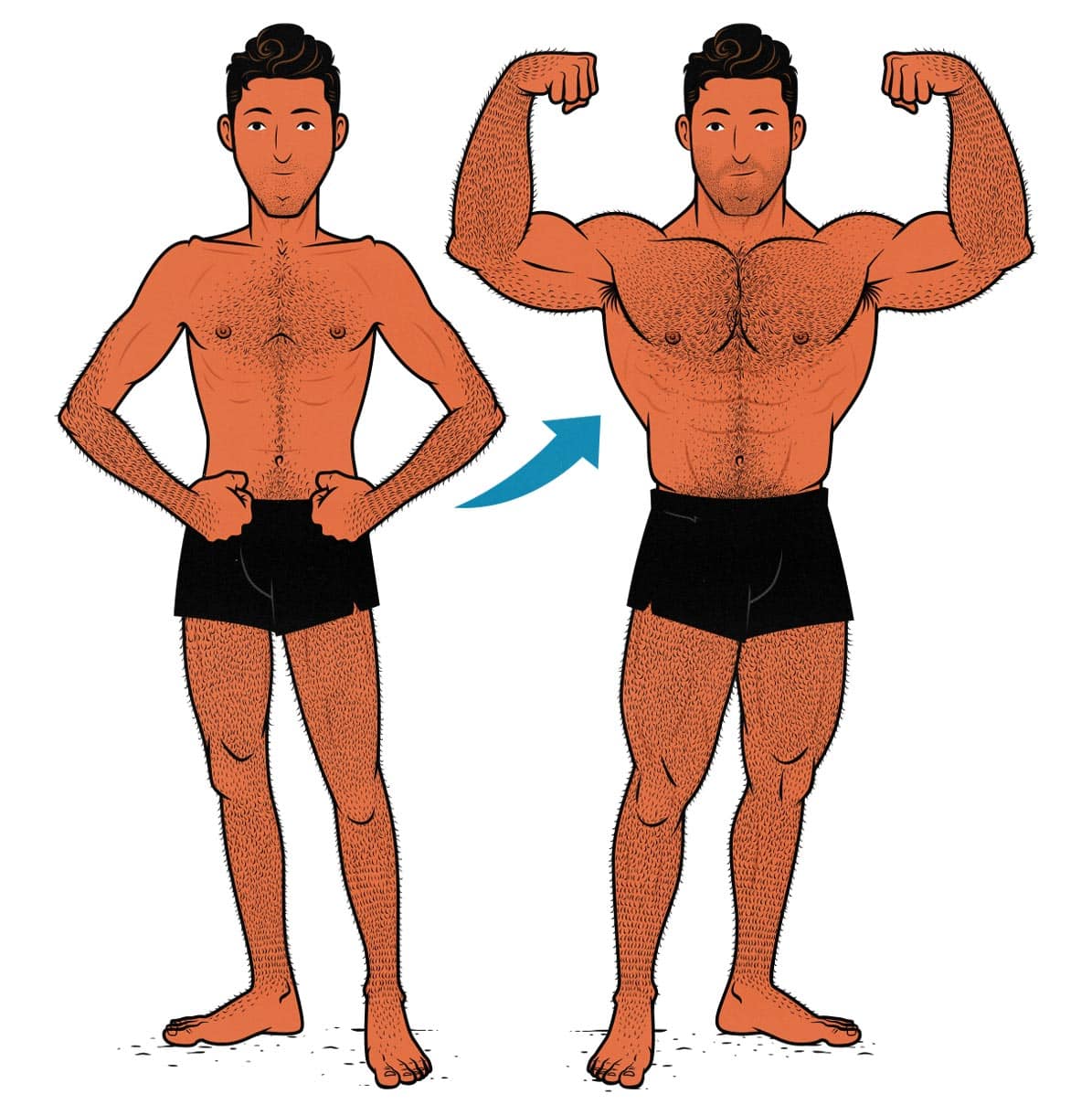
Understanding Shoulder Aesthetics
Most people think the research shows that building broad shoulders is the most important part of developing an aesthetic physique (study, study, study). Even better if you pair those broad shoulders with a lean and narrow waist, giving you a V-taper physique.
That isn’t quite what the research shows, and we’ll delve into the nuance in a moment, but there are some very real advantages to having broader shoulders.
Why Are Broad Shoulders More Attractive?
During puberty, testosterone binds to the androgen receptors in the bones and muscles of our shoulders. This makes our clavicles grow longer and our deltoids grow bigger, making our shoulders broader.
Men produce more testosterone and have more androgen receptors in their shoulder girdles than women, so men tend to develop broader shoulders after going through puberty. This gives men a distinct shape from women and boys (study).
The shoulders also hold quite a bit of muscle, such that when you measure a man’s shoulder circumference, you’re also measuring how big his delts, pecs, serratus, and upper back muscles are. This makes shoulder circumference a fairly reliable proxy for a man’s overall strength.
So, broad shoulders signal that a man is both masculine and strong.
The Adonis Index & the Ideal Shoulder Circumference
The ideal shoulder circumference is often said to be 1.618 times the size of your waist. So if you have a 32-inch waist, your ideal shoulder circumference would be 52 inches. There’s a grain of truth here that makes this idea appealing.
This shoulder-to-waist ratio is called the Adonis Index. The name comes from Greek mythology, where Adonis is the god of beauty and desire. The idea is that the human body looks most aesthetically pleasing when it conforms to divine proportions. In this case, the ideal male proportions are rooted in the Golden Ratio (Phi), a ratio commonly found in nature and classic art.
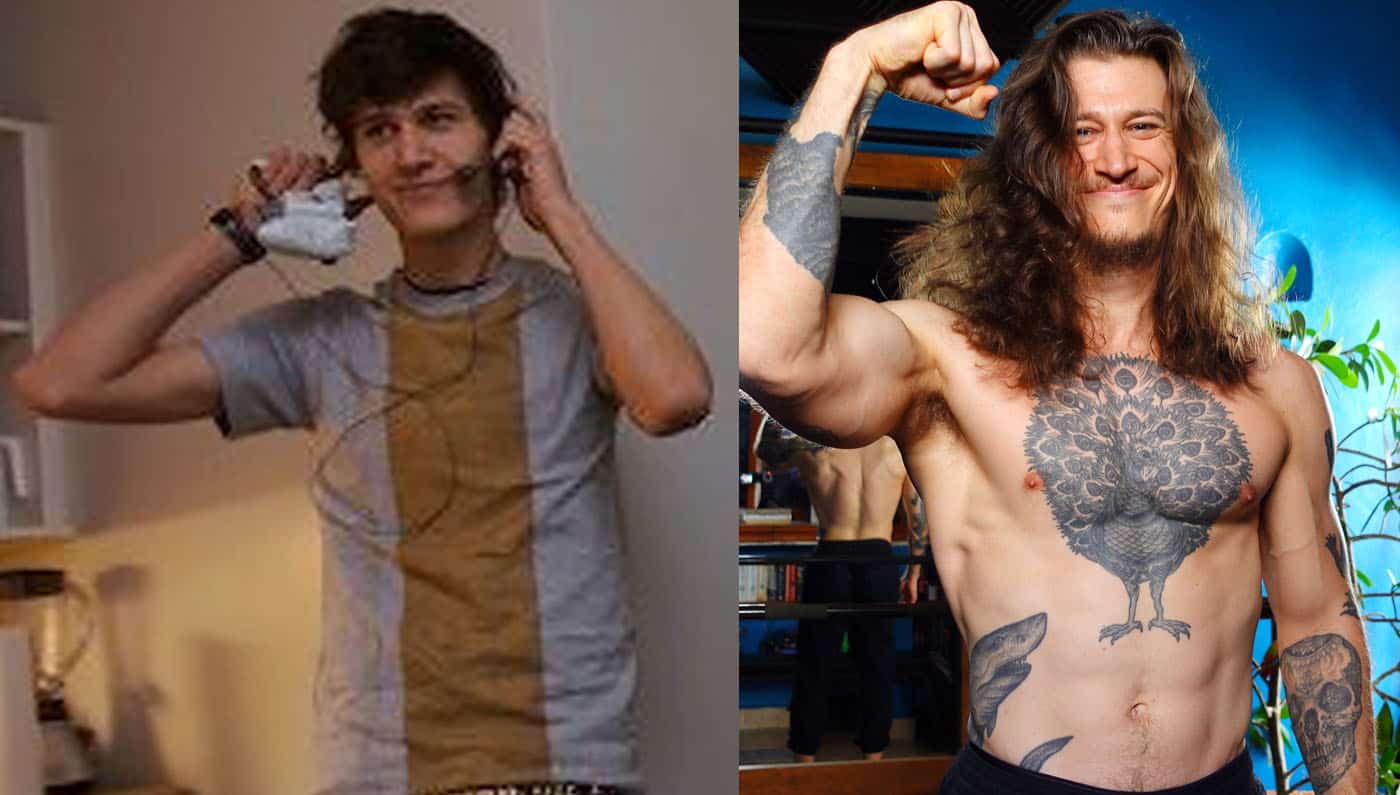
If you want to see what that looks like, here I am with a shoulder-to-waist ratio of 1.618.
There’s a grain of truth to the Adonic Index. This shoulder-to-waist ratio is fairly common among strong guys with healthy body-fat percentages. I never intentionally tried to get the ideal shoulder-to-waist ratio, but I developed it naturally while bulking up. That isn’t true for everyone, but it’s true for enough men that it often feels right.
The Problem With the Adonis Index
Shoulder-to-waist and chest-to-waist ratios are used interchangeably in most research. Our chest-to-waist ratio has nothing to do with our shoulder muscles, and yet a higher chest-to-waist ratio was just as indicative of attractiveness as having broad shoulders.
Both ratios are used as loose proxies of muscularity and leanness. The more muscular we get, the bigger our chests, backs, and shoulders become, giving us larger shoulder-to-waist and chest-to-waist ratios. The leaner we get, the smaller our waists become, boosting the ratio even further.
So I conducted some research of my own. I drew a man with a greater shoulder-to-waist ratio and bigger shoulder muscles. Then I drew a man with bigger chest muscles and narrower shoulders. Both were similarly lean and muscular overall.
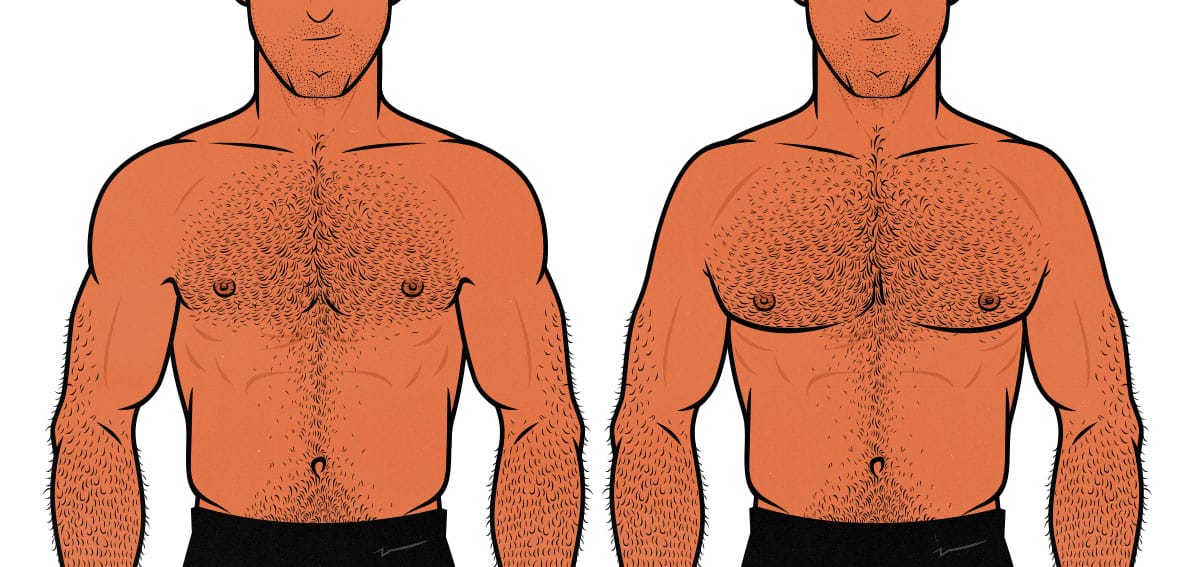
I surveyed a little over 400 women, asking them which proportions they found more attractive. 65% of them said they preferred the guy on the right, with the bigger chest but smaller shoulder-to-waist ratio. Men had the same preference. I suspect that’s because, at least from this angle, the guy with the bigger chest looks stronger.
This lines up with the results of a study by Sell and colleagues (study). Sell found that stronger men tended to look stronger. Those stronger men were rated as more attractive by women.
How to Balance Your Traps & Shoulders
Some of the best shoulder exercises also train your traps. That’s true of both overhead presses and lateral raises. As you lift your arms, you also shrug your shoulders, working your deltoids and traps together. That’s a natural, athletic way to lift weights, but some people worry they’re working their traps too hard.
They argue we should build bigger shoulders while keeping our traps smaller. The idea is that overdeveloped trap muscles make our shoulders look sloped instead of square.
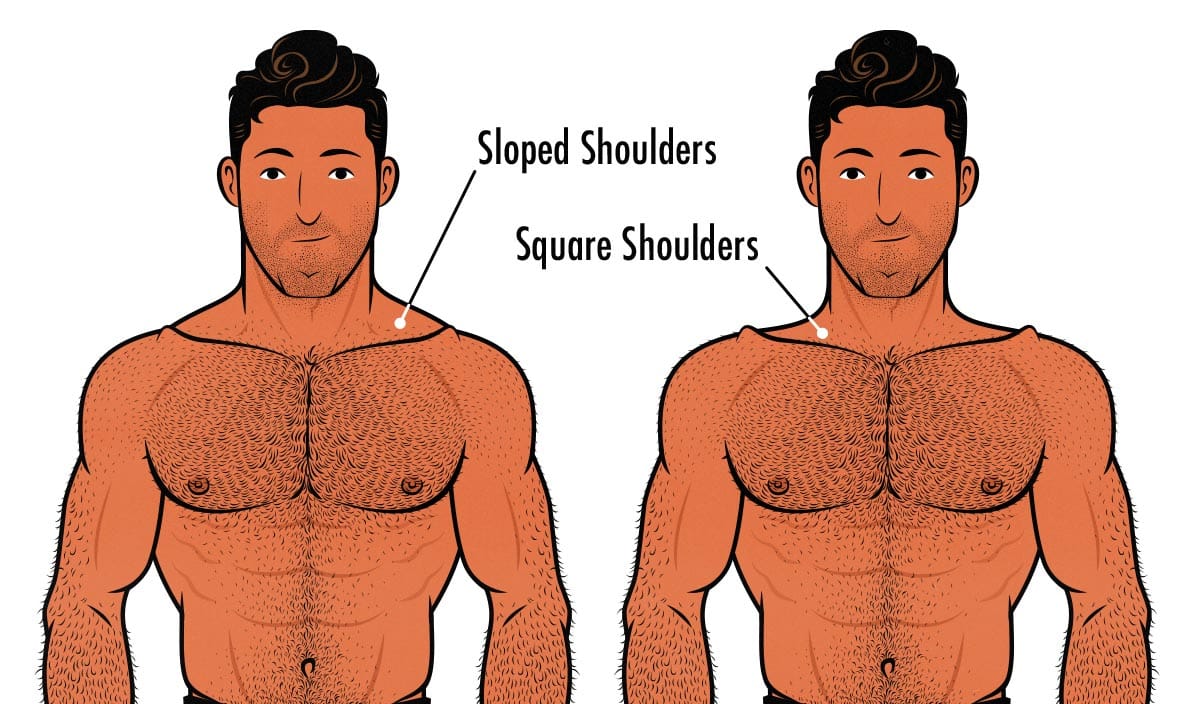
There’s a glaring problem with this idea, but first, let’s get on the same page about what your trap muscles are and what they do. Your traps are the muscles that connect the base of your neck to your shoulders and back. They help you move your neck, shoulders, back, and arms. They also help us maintain proper shoulder posture.
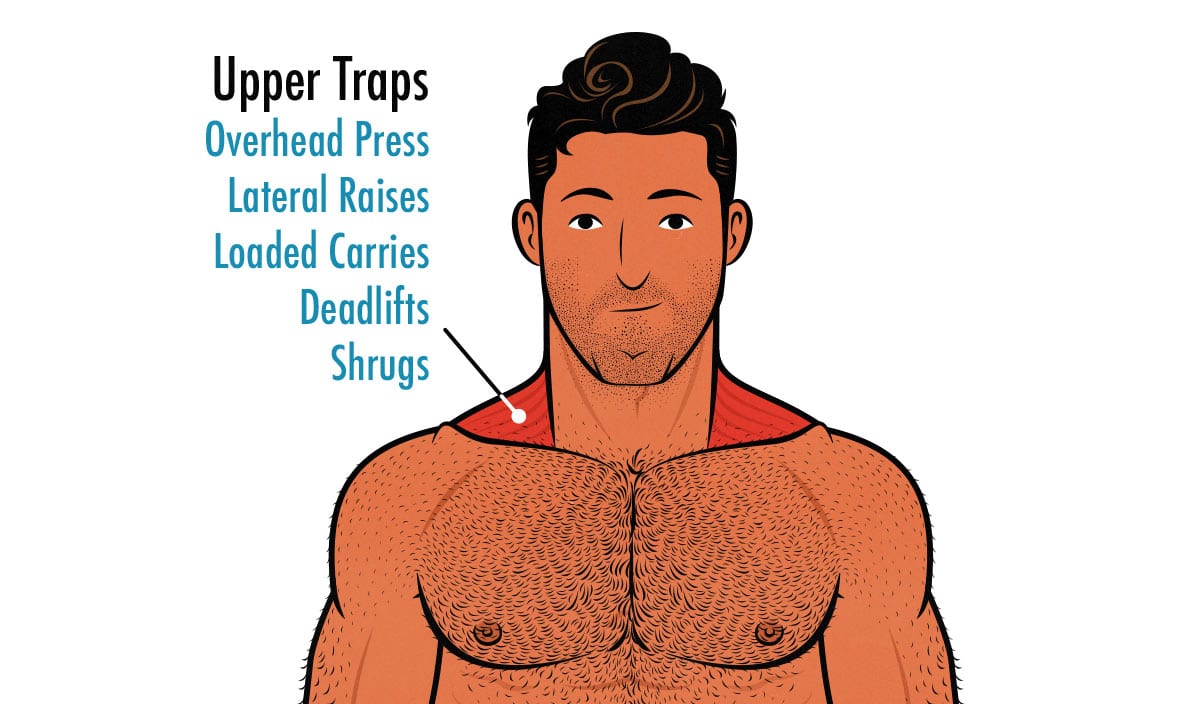
Of all our many muscles, our traps are some of the most important. You’ll notice them working whenever you carry heavy things, whether that’s doing deadlifts, lugging around heavy objects, rucking with a heavy backpack, or carrying your kid in your arms. The stronger you are, the bigger your traps will get.
Furthermore, men have proportionally more androgen receptors in their shoulder girdles than women. That means having proportionally bigger traps is distinctly masculine. Masculine traits tend to be attractive to women. Men also tend to find masculine things cool.
Here’s the problem. Some people think overdeveloped traps give guys sloped shoulders. That may be true, but if you’re a natural lifter following a balanced workout program, your traps won’t become overdeveloped. You’ll grow stronger overall, your posture will improve, your traps will grow bigger in proportion to your other muscles, and you’ll look better.
How to Improve Your Appearance
Broader shoulders look good because they showcase strength. The same can be said of building bigger traps, a wider chest, a thicker back, a stronger core, or bigger arms. That’s good news for us narrow-framed guys. It doesn’t matter very much if we have short clavicles. We just need to become strong and fit.
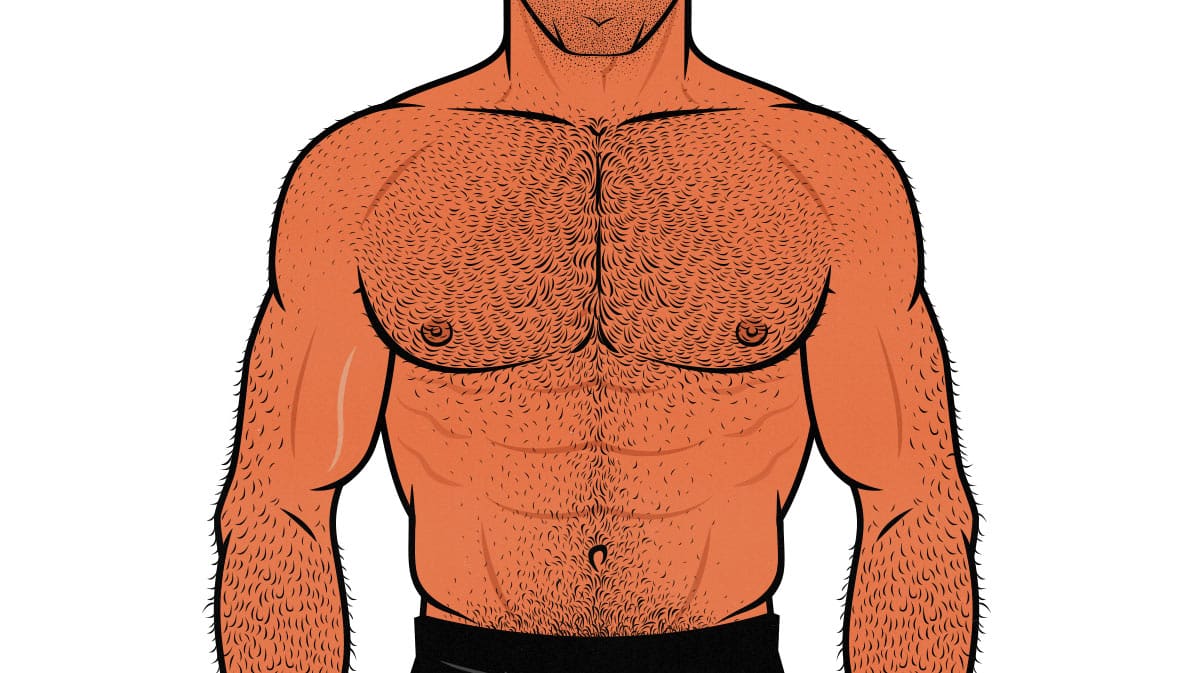
Still, building bigger shoulder muscles is part of building a stronger, fitter, and more attractive physique. You don’t need to give your shoulders a disproportionate amount of attention, but it definitely helps to bulk them up, just like how it helps to bulk up everything else.
Bone Structure & Body Type
Before we explain how to build bigger shoulders, let’s distinguish between having a broad bone structure and having muscular shoulders. There’s a large difference between the two, but that difference isn’t always obvious.
Most people place more weight on bone structure, but as we covered in the last section, that’s backwards. Broad shoulders symbolize strength. Being strong is more important than having long clavicles (though having long clavicles certainly doesn’t hurt).
Narrow Shoulders From Narrow Clavicles
Our clavicles (collarbones) grow steadily until we’re 12 years old, giving us 80% of our total clavicle length. When puberty hits, clavicle growth accelerates. By around 18 years old, our clavicles reach their final length (study). That means if you’re 18 or older, the only way to build broader shoulders is to build muscle.
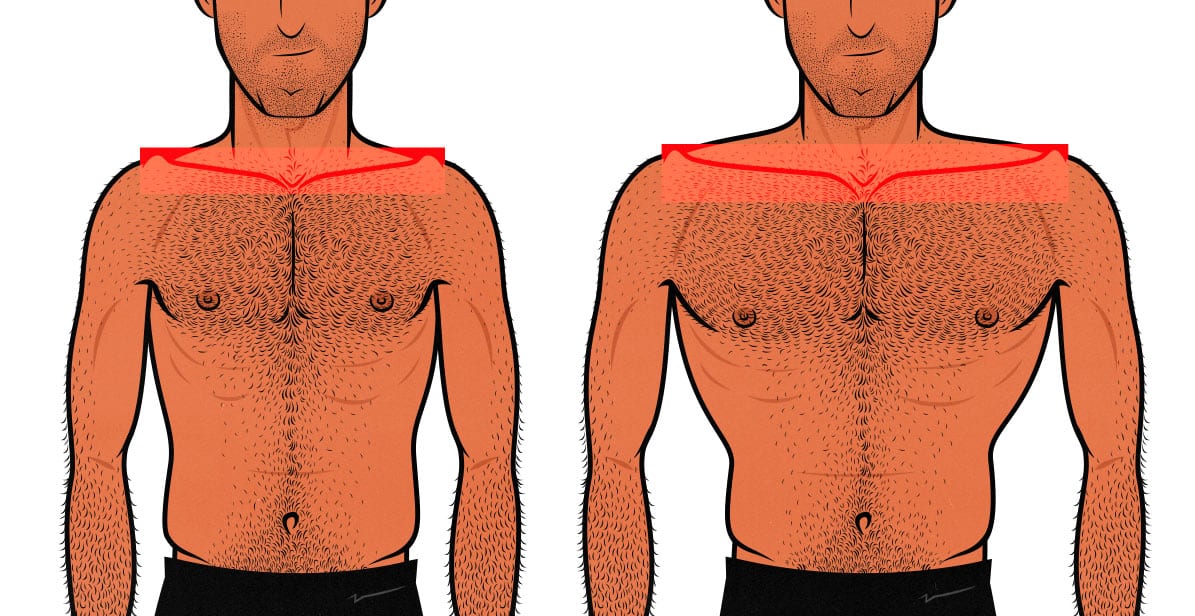
Some guys get lucky. They have long clavicles, giving them naturally broad shoulders. Other guys are naturally muscular, giving them naturally muscular shoulders. Some guys are blessed with both advantages. For better and worse, these guys are often called “mesomorphs.”
On the other end of the spectrum are the naturally thin “ectomorphs.” That’s my body type. I have a narrower frame, thinner bones, and a smaller appetite. Said another way, I’m naturally skinny. That’s where things get interesting.
Everyone Can Build Broader Shoulders
When I was skinny, I had narrow shoulders, as you can see below. At 21 years old, I weighed 130 pounds, my shoulder circumference was 39 inches, and I wore size small shirts.

Over the next few years, I gained 65 pounds, adding 13 inches around my shoulders and bringing my shoulder circumference up to 52 inches.
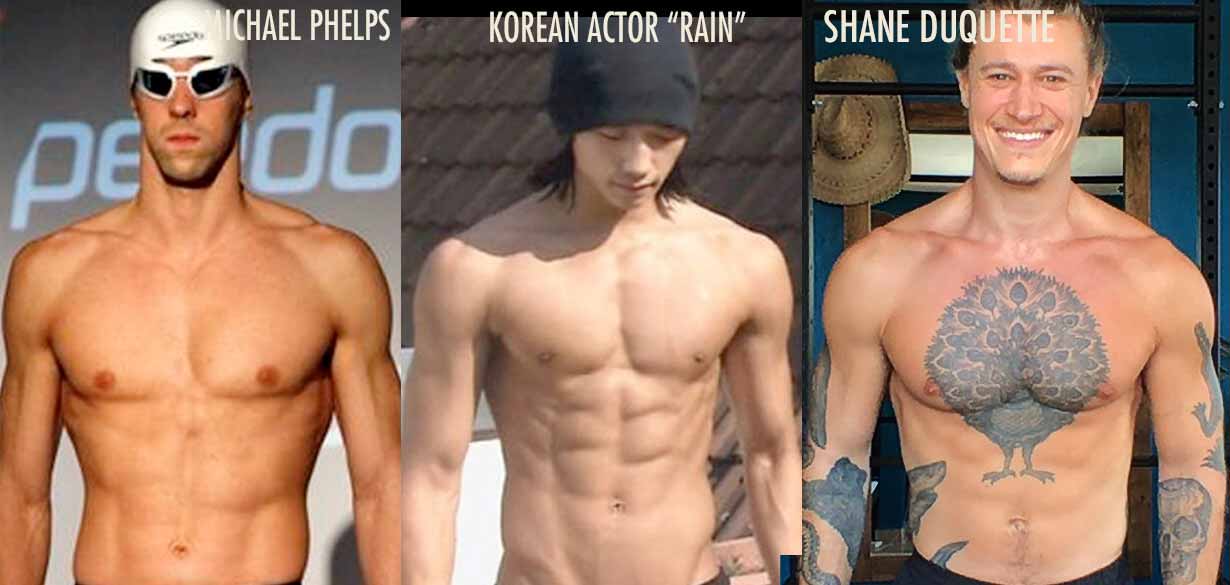
At this point, my business partner, Jared, started using me as an example of someone with naturally broad shoulders. Clearly, he argued, my clavicles had been long the entire time. As proof, he put me in a spread with other guys known for having broad shoulders (shown above).
We see this same thing all the time. Skinny guys feel like they have naturally narrower shoulders. Then, when they bulk up, they’re surprised by how much broader their shoulders become. For example, here are Josua’s before and after photos from doing our Bony to Beastly Program:
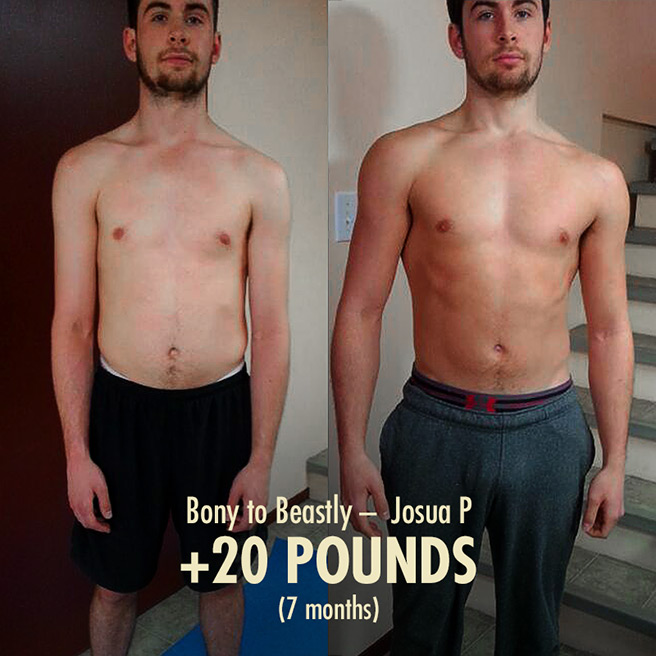
What’s interesting is that it isn’t just our deltoids making our shoulders broader. It seems that building bigger lats and serratus muscles—the muscles underneath our armpits—pushes our shoulders out wider. This can make it seem like our body type is changing.
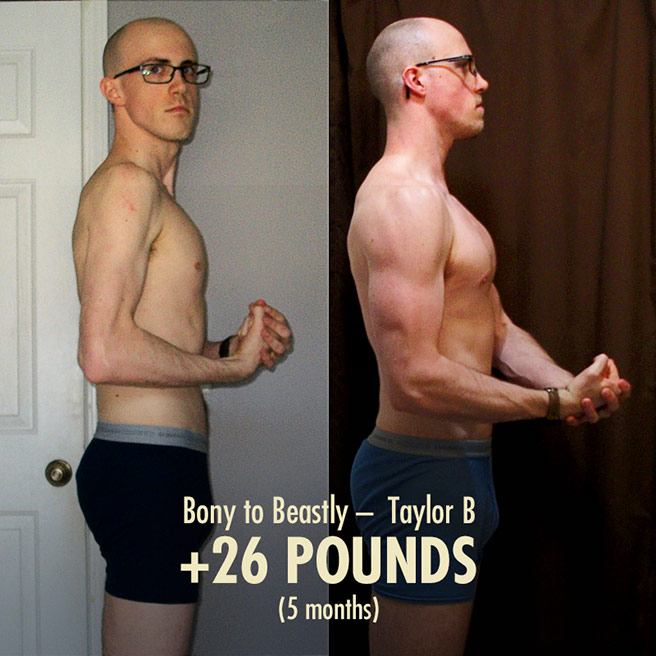
Here’s another example, this time showing a side view. As you can see, with a few months of hard work, you can transform the size, strength, and shape of your shoulders.
How Much Muscle Do You Need to Gain?
Even if you’re a thin guy with a narrow bone structure, your shoulders can grow much bigger. They respond incredibly well to resistance training. Plus, many of the best shoulder exercises will also bulk up the muscles underneath your armpits, pushing your shoulders out wider.
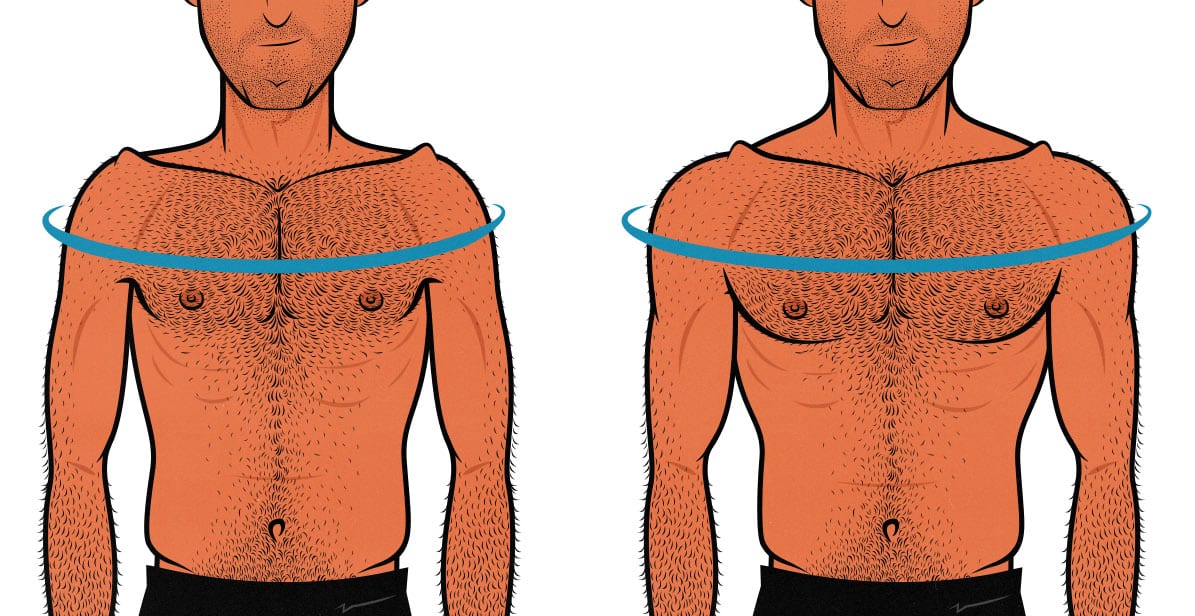
These guys both have the same clavicles, it’s just that one has bigger shoulder, serratus anterior, and chest muscles. This pushes his shoulders out wider and gives them more volume. However, to make a noticeable difference, you might need to gain quite a lot of muscle. In our experience, guys usually need to gain at least 20 pounds to build noticeably broader shoulders.
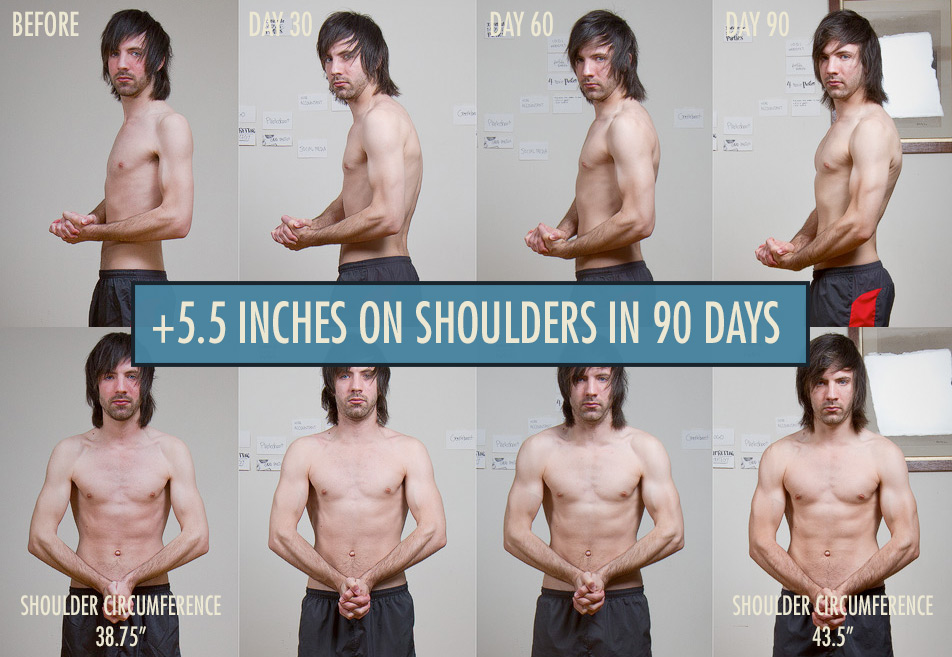
For example, here’s Jared gaining 33 pounds in 3 months from an aggressive bulk. When he started, he was wearing billowing small shirts. By the end, he was fitting snuggly into medium shirts.
The Best Shoulder Exercises
Shoulder Muscle Anatomy
Our shoulders have three different groups of muscle fibres: the front delts, side delts, and rear delts. They all have different functions, making it impossible to train them all with a single lift (though the overhead press comes close). Our front delts push stuff away, our side delts lift stuff out to the sides, and our rear delts pull stuff in.
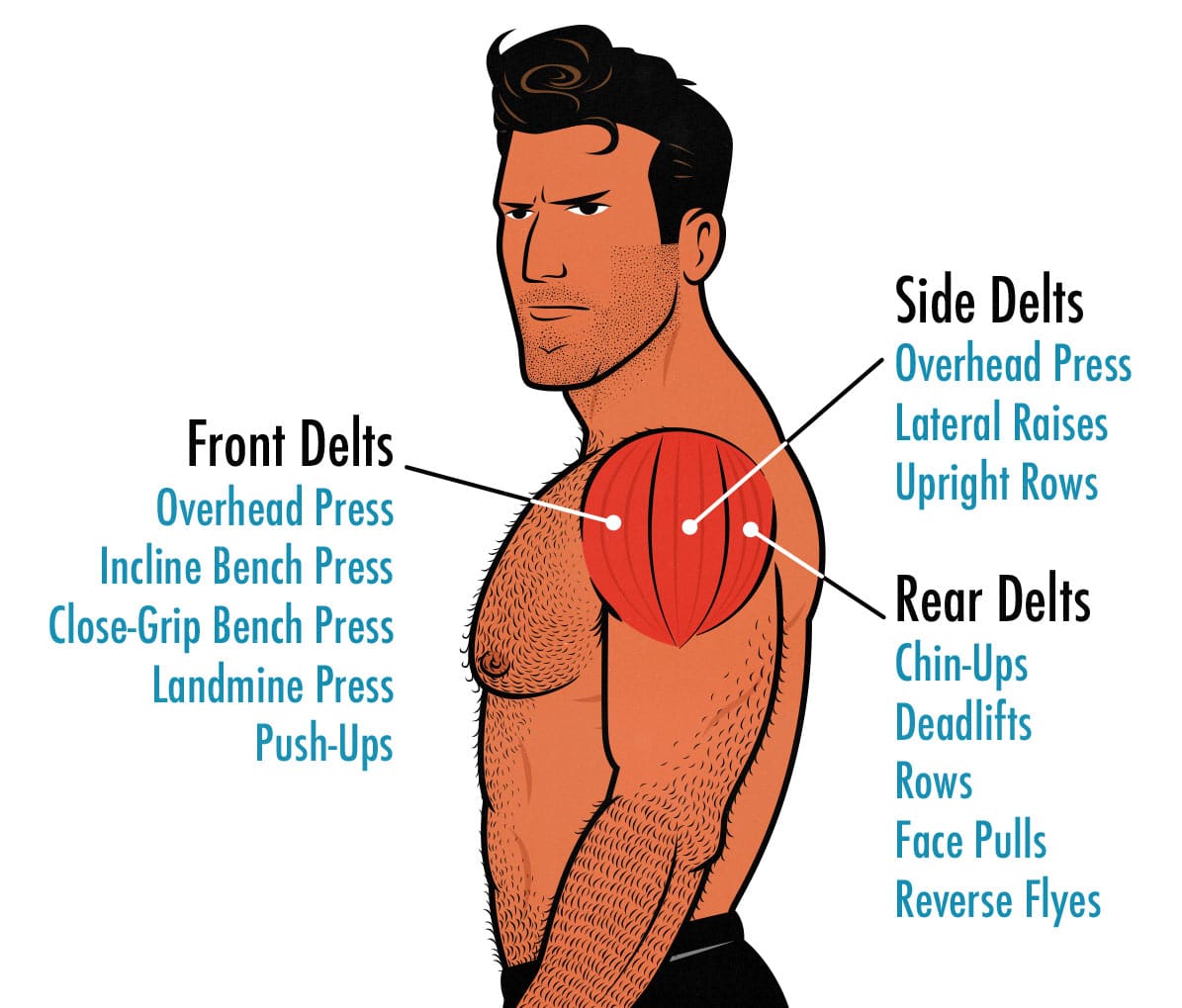
Our deltoids are surprisingly large. They’re around 60% bigger than our chests and 400% the size of our biceps. This gives them tremendous growth potential. The average guy doing our bulking program adds over 4 inches to his shoulder circumference in 6 months.
If you’re already in the habit of lifting weights and have already succeeded at gaining your first 20–30 pounds, we’ve got a more advanced list of shoulder exercises. Otherwise, keep reading.
The Best Side Delt Exercises
The side delts are at the sides of your shoulders. Making them bigger will make your shoulders broader. They’re simple to train, too. All you need are lateral raises.
There are a few different types of lateral raises. Standing dumbbell lateral raises are great for beginners, but as you grow more advanced, you can switch to harder variations that stimulate even more muscle growth.
Here’s a quick tutorial video of me teaching the different lateral raise variations:
The Best Front Delt Exercises
The front delts are the largest part of our shoulders. They’re involved during pressing movements, including bench presses, push-ups, and overhead presses.
Push-ups are the best exercise to start with because they work your chest and front delts while also bulking up your serratus anterior. If you’re a beginner, I recommend working towards being able to do 20+ perfect push-ups in a row. From there, you’re free to progress to weighted push-ups, deficit push-ups, bench presses, and dips.
Here’s Marco teaching the push-up. Note that he recommends pushing your body as far away from the ground as possible. That’s the part of the lift that engages your serratus muscles.
In addition to push-ups, we recommend overhead presses. Overhead presses do a great job of working both your front delts and your side delts, making them arguably the best compound exercise for building bigger shoulders. They’ll also bulk up your traps.
Once you’ve mastered the dumbbell overhead press, you’re free to do other variations, seated or standing, with a barbell, dumbbell, or exercise machine. I really like standing barbell overhead presses. Some people stick with dumbbell overhead presses forever.
The Best Rear Delt Exercises
The rear delts are at the back of your shoulders. They’re trained with pulling exercises like deadlifts, chin-ups, and rows. That’s often enough to bulk them up. However, if you’re eager to bulk up your shoulders, you can speed up your rear delt growth with isolation lifts like face-pulls, rear-delt flyes, or TYIs:
TYIs work your rear delts and traps through 3 different ranges of motion, giving you more balance muscle growth and doing a better job of strengthening your shoulder joint. Marco is demonstrating these without weight, but you can load them by holding dumbbells or smaller weight plates.
The Shoulder Workout Routine
If you’re already an intermediate lifter, we’ve got an article about shoulder workouts. If you haven’t gained your first 20–30 pounds yet, this one will serve you better. All you need are dumbbells or weight plates.
| Exercise | Sets | Reps/Duration |
|---|---|---|
| Push-Ups | 3–4 sets | AMRAP |
| Dumbbell Press | 3–4 sets | 10 reps |
| Lateral Raises | 3 sets | 12 reps |
| TYIs | 3 sets | 6 reps per letter |
It’s a simple but effective shoulder workout. Push-ups work your chest, front delts, and serratus anterior. The dumbbell press works your front delts, side delts, and traps. Lateral raises work your side delts, rear delts, and traps. TYIs work your rear delts, traps, and upper back.
- Rest times: rest 1.5–2 minutes between each set.
- Failure: push yourself on every set, going to the cusp of failure. Consider taking the final set of each exercise all the way to failure, especially on your lateral raises and TYIs.
- Progressive overload: try to outlift yourself every time you repeat the workout. Fight to lift more weight or squeeze out more reps. If you got 10, 9, and 8 reps (27 reps) last workout, try to get 28+ this workout.
- Form: watch the tutorial videos and try to lift with good form, but don’t worry if you can’t. It will come with practice.
You don’t need to do all of these exercises as part of the same workout. In fact, you should probably build them into a full-body workout routine, training your shoulders along with your other muscles.
Try to do each exercise twice per week. If you’re doing them all as part of the same workout, do it twice per week. That’s the fastest way to bulk up your shoulders.
Eating for Muscle Growth
Training your shoulders will stimulate 2–4 days of muscle growth. Then you need to eat enough food to build your muscles back bigger and stronger than they were before. That way, you show up to your next workout able to outlift yourself.
- If you’re skinny-fat or overweight, you don’t need to worry about eating in a calorie surplus. You have plenty of extra energy stored as body fat. You can burn through that, using it to build muscle. Just make sure you’re eating a balanced diet rich in protein, starchy carbs, healthy fats, and fibre.
- If you’re skinny or lean, you’ll need to get into a calorie surplus to build muscle. You’ll need to eat a good bulking diet. You need energy to convert the protein you eat into muscle, and you need carbs to pack that muscle full of glycogen.
Frequently Asked Questions
What’s the Bony Bump Above My Shoulder Joint?
The small bony bump above your shoulder joint is the acromioclavicular joint (ACJ). Some people have a more pronounced bump than others. Skinny guys have more prominent shoulder bumps, so we often get questions about it.
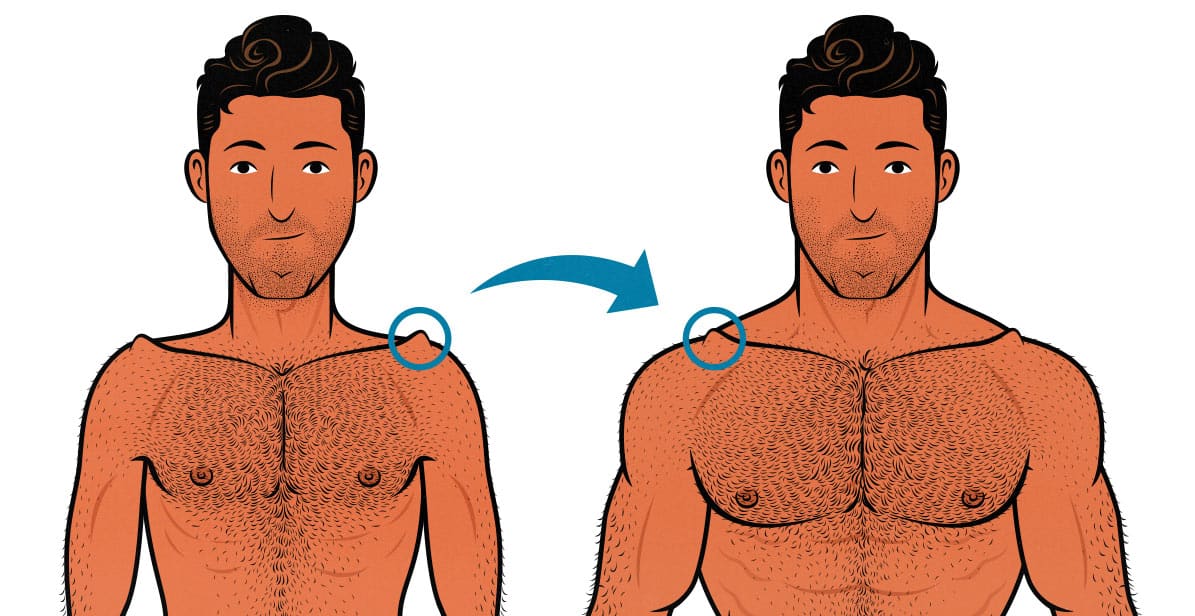
When you’re bony, your body is shaped by your bone structure. You have harsher angles and more prominent bumps. As you build muscle, that muscle will contribute more to your body shape. The bony protrusion above your shoulder joint will be buried by your upper traps.
I have a prominent bump above my shoulder. It’s much less noticeable now that I’ve bulked up, but it’s still there. I use it as a hook to keep straps from slipping from my shoulders. It’s great for carrying grocery bags.
How to Fix Poor Shoulder Posture
Because the modern lifestyle involves so much time spent sitting, it’s common to adapt to that position, developing internally rotated shoulders. That may be just fine for typing, but it can limit your range of motion and shave precious inches off your shoulder breadth.
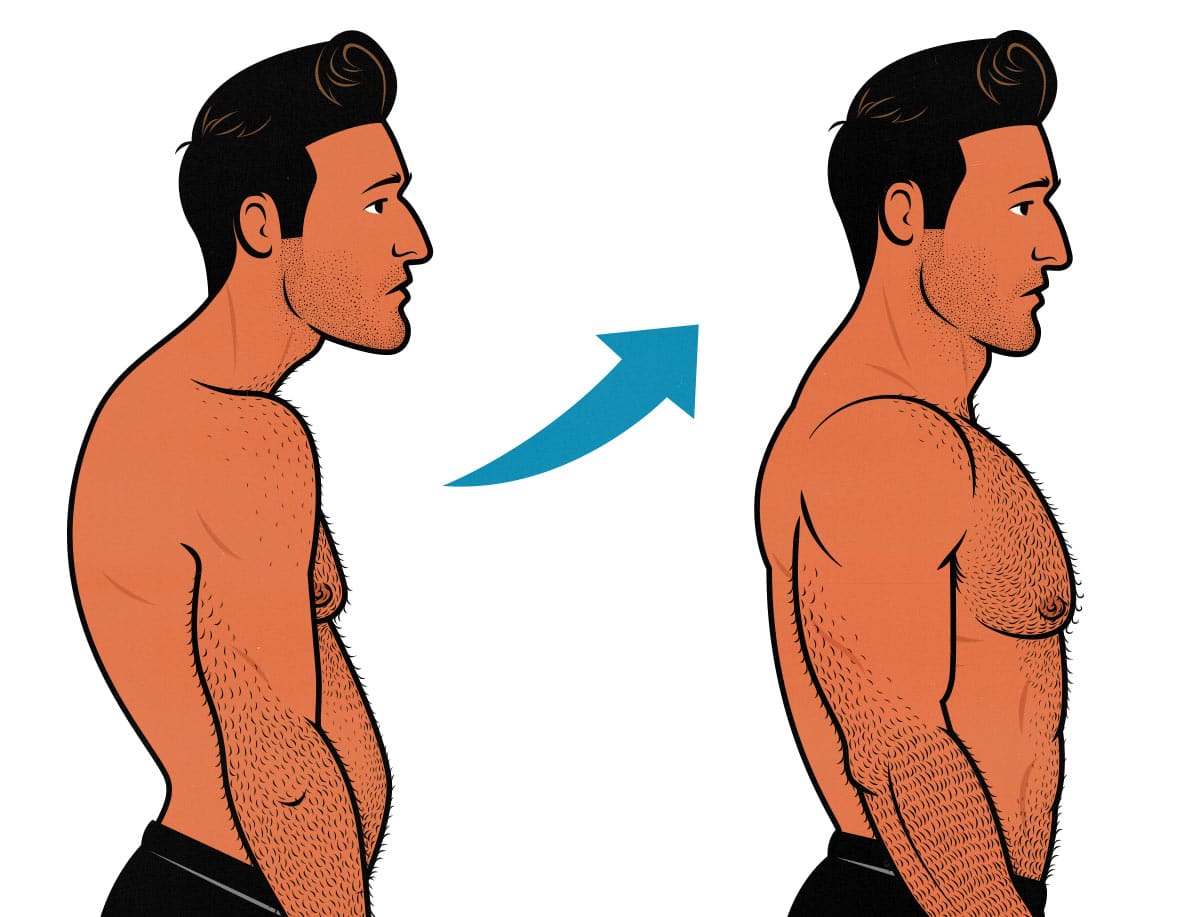
The best thing for improving posture is also the hardest. Doing drills and stretches is easy, but it doesn’t always work very well. A more effective approach is to strengthen your entire body, including your postural muscles. Think of exercises like deadlifts, goblet/front squats, push-ups, planks, rows, and chin-ups.
The good news is that all of those muscles will help you build broader shoulders. Goblet squats, for example, are fantastic for bulking up your serratus muscles and improving your shoulder health while also pushing them out wider.
What If You Can’t Press Overhead?
Poor shoulder posture can limit your shoulder mobility. Many beginners struggle to press weights overhead, preventing them from doing the overhead press properly. Use this exercise progression instead:
- Start with push-ups to bulk up your shoulders while strengthening your serratus anterior, allowing for better movement in your shoulder joint.
- Use the incline bench press or landmine press to work your front delts without needing to press the weight all the way overhead.
- Progress to the half-kneeling one-arm dumbbell press. This will teach you how to press a dumbbell overhead. Once you can do it kneeling, you’ll be able to do it standing.
- The standing one-arm dumbbell press: once you’re comfortable pressing a single dumbbell overhead from a kneeling position, try it from a standing position.
- The overhead press: once you’ve got the hang of pressing with one arm, start doing both arms at once, either with two dumbbells or a barbell.
If this still seems complicated, our bulking program will help walk you through the entire process of gaining muscle, improving posture, and building a strong overhead press.
How to Fix Bony Shoulders
Skinny people are often concerned about having bony shoulders. It’s common for romantic partners to complain about not having a place to rest their heads. Our members often write about this when they post their before photos. I’ve gotten that comment, too.
Fortunately, bony shoulders have nothing to do with your bones at all. It’s just there isn’t enough muscle on top of them. If you build bigger shoulder muscles, your shoulders won’t be bony anymore.
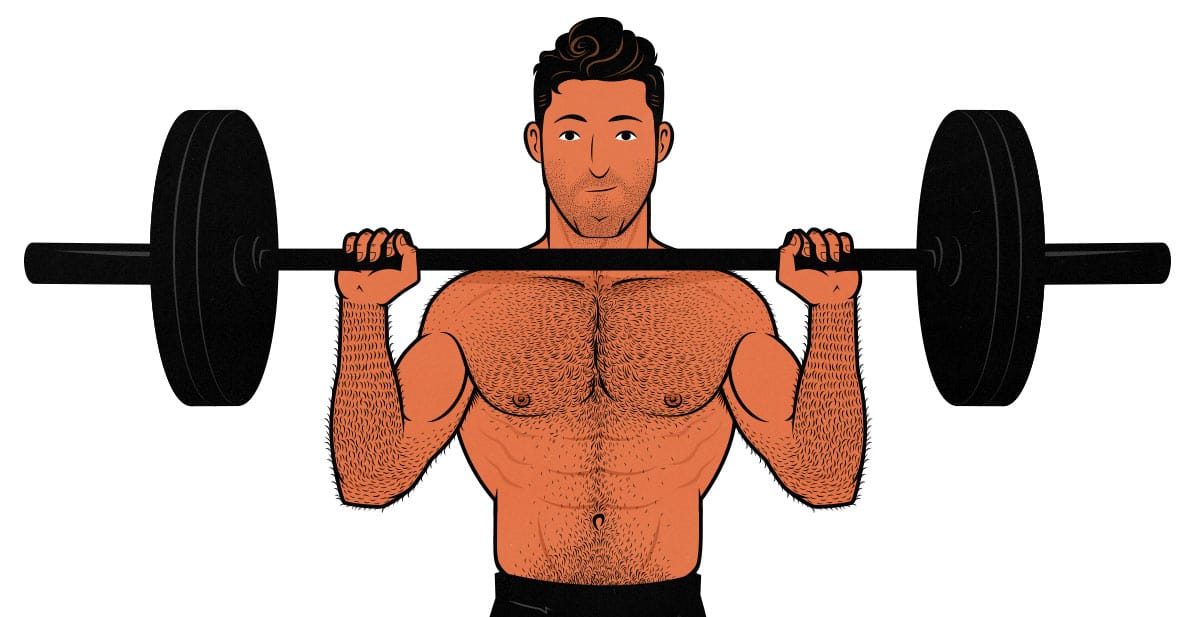
Conclusion
Some guys have narrower bone structures than others, but everyone can build broader shoulders if they choose good shoulder exercises, lift for muscle growth, and eat a good bulking diet. With a good bulking program, you can expect to add 4–5 inches to your shoulder circumference within the next 6 months.
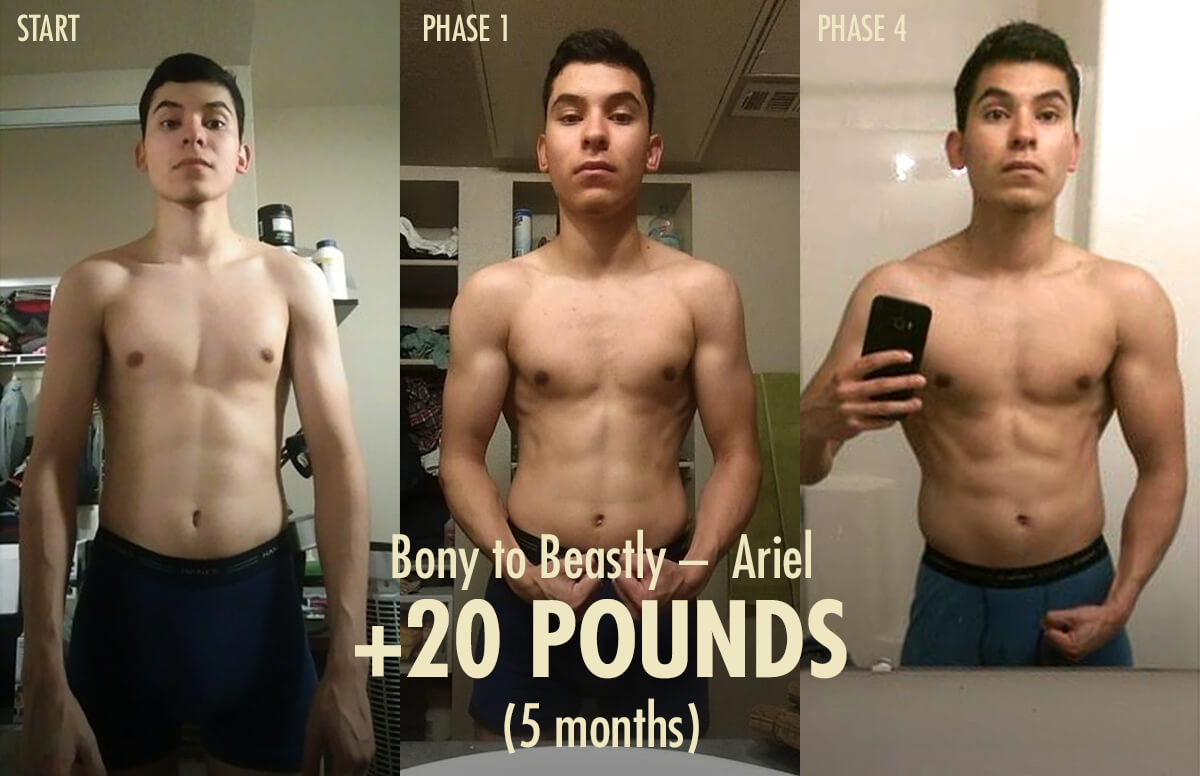
If you want us to walk you through the entire process of bulking up, check out our Bony to Beastly Program. It includes a customizable workout routine, a bulking diet guide, a recipe book, and support from us in our online community.
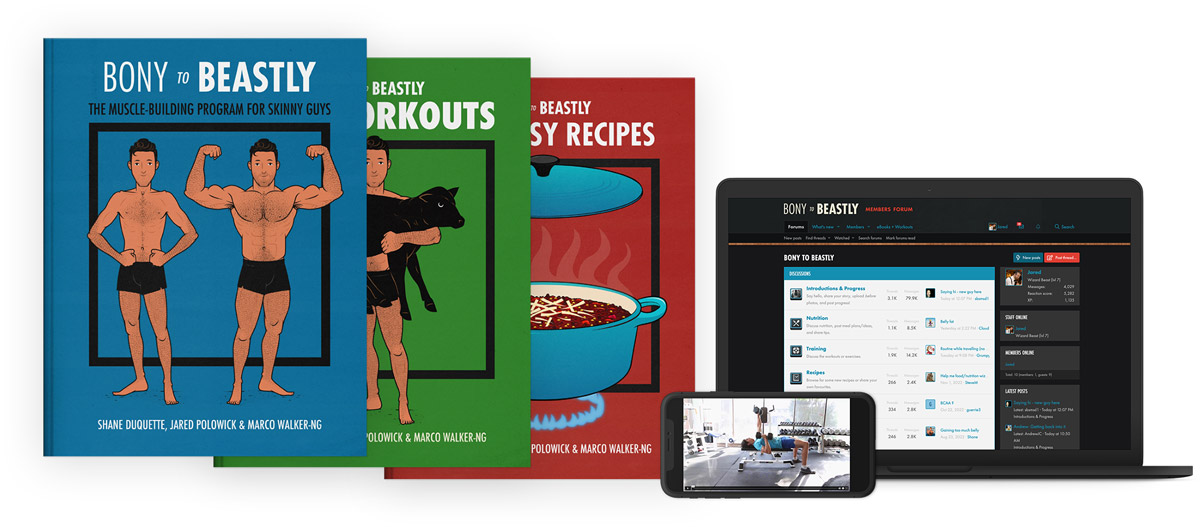
We’ll help you get started, track your progress, answer all your questions, and give you feedback as you go through the program. Your results are fully guaranteed. We have an unconditional refund policy.

